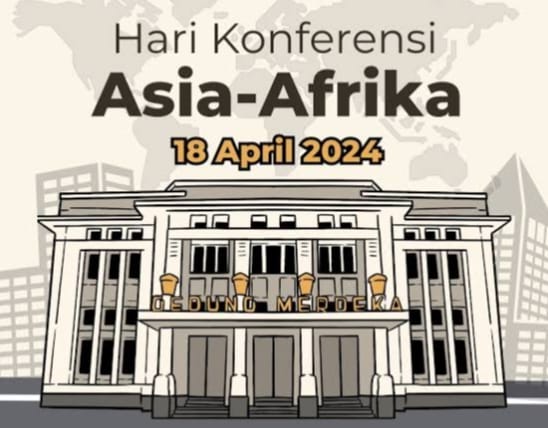Reviving the values of the Asian-African Conference in the face of today’s global turmoil
Reigniting the Bandung Spirit: Fostering Global Peace through International Harmony

KAA Building Replica Caricature. Foto by APU-PPT
In a world still engulfed by ideological, economic, and political conflict, the 1955 Asian-African Conference (AAC) held in Bandung, Indonesia, has regained its relevance. The war between Russia and Ukraine, the Palestinian-Israeli conflict, and growing tensions among nations in Asia and Europe demonstrate that global peace remains a goal to be pursued. As the initiator of AAC, Indonesia possesses a legacy of values that are deeply relevant for today’s international landscape.
Bandung Spirit and the Global Reach of the Ten Principles
The AAC was a historic moment that brought together newly independent countries from Asia and Africa, united in the vision of cooperation, solidarity, and peace. In his opening speech, President Sukarno emphasized that this was more than a political gathering — it was a global humanitarian declaration:
“We, the peoples of Asia and Africa who have just won our freedom, wish to stand tall and equal among the nations of the world.”
This monumental conference produced the Ten Principles of Bandung, which laid the foundation for peaceful and respectful international relations. These included:
• Respect for fundamental human rights,
• Respect for sovereignty and territorial integrity,
• Peaceful settlement of disputes,
• Non-interference in the internal affairs of other nations,
• Cooperation for mutual benefit.
These principles inspired the establishment of the Non-Aligned Movement and have continued to influence efforts toward a more just and peaceful global order.
Continued Relevance in the Modern World
Academic from Dipenegoro University, Prof. Singgih Tri Sulistiyono emphasized that the spirit of the Asian-African Conference remains relevant. International cooperation, he asserts, must be built on principles of humanity and justice not economic dominance or military superiority. Today’s multipolar world presents an opportunity for Asian and African nations to renew their solidarity in the pursuit of global equity.
The AAC reminds us that differences in background are not barriers to unity, but rather sources of strength in building a common future.
Global Harmony Begins with Personal Character
Global peace does not emerge in a vacuum; it is rooted in the culture of harmony cultivated within communities. In this context, the noble values promoted by LDII (Lembaga Dakwah Islam Indonesia) offer a meaningful framework. One of the important components of the 29 noble characters developed by LDII is the Five Conditions of Harmony, which are:
1. Speaking kindly – using polite and respectful language with manners and cultural etiquette (pahit madu, unggah-ungguh, papan empan adepan) to maintain healthy communication and avoid harm.
2. Being trustworthy and trusting others; being honest and responsible (amanah) – building mutual trust as the basis of all relationships.
3. Being patient, willing to concede, even competing to concede (keporo ngalah, rebutan ngalah) – prioritizing dialogue and shared understanding over personal pride.
4. Do not harm others (self, property, human rights and honor) – recognize and uphold the dignity and rights of others.
5. Paying attention to and protecting others' feelings – nurturing empathy to strengthen personal and communal bonds.
These five principles serve as a guide not only for harmonious living within societies but also for fostering respectful and effective diplomacy among nations. Nations led by individuals who embody these virtues will be better equipped to build peaceful and mutually beneficial international relationships.
Indonesia’s Moral Role in Promoting Peace
As the host of the original AAC and a country committed to a “free and active” foreign policy, Indonesia bears both a historical and moral responsibility to promote world peace. By re-internalizing the Bandung Spirit and practicing these character values nationally, Indonesia can play a strategic role as a bridge between nations, a guardian of humanitarian ideals, and a driving force for diplomatic peace.
“We don’t have to be a superpower to make a meaningful contribution to the world. We only need to consistently uphold noble values and embody them in our daily actions.”
From Bandung to the World
The Asian-African Conference is a timeless legacy. The values it birthed in Bandung in 1955 remain powerful tools for addressing the challenges of our global society today. By fostering harmony from the individual to the international level, we can together realize the vision of a peaceful, just, and prosperous world.
Let us inherit the Bandung Spirit not only in speeches but in our actions—starting from our own communities and carrying those values beyond national borders.
Author:
Thonang Effendi
Chair of the Department of Public Education and Training, DPP LDII
Observer and Practitioner of Character Education for the Nation’s Youth
Editor :Tim Sigapnews

